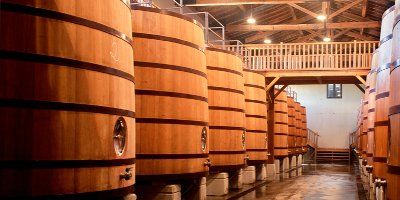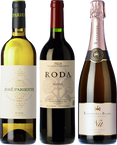Agustín Santolaya, managing director of Bodegas Roda, always explains that Roda's objective is to make wines for enjoying at the table, wines which don't saturate the palate, wines made not to impress but to be liked and enjoyed glass by glass, wines to take delight in time and time again. Pour yourself out your first glass of Roda and you'll perfectly understand this philosophy: good, dark, deep —our first impression—; fruit-forward, mature, sweetish —the second. Conclusion: an expressive wine, rounded and extremely pleasant.
We might just limit our description to these few words, but if we were looking to fill out its letter of introduction, we could add that Roda is not only a good wine, a good buy, but also one of those wines to choose when you have guests for dinner but you don’t know their particular palates or experiences; this is a wine to please everyone (so too the range’s three main exponents: Sela, Roda and Roda I). It is a complete, smooth, fresh and, at the same time, warm wine; it will host the occasion perfectly.
Roda originates from the neighbourhood of the greatest Rioja classics; it is a Rioja Reserva, yet its production method differs from that of its neighbours, although it does correspond with them in elegance and easy-drinking style. The principal variety partaking in its coupage is the Tempranillo (89%) as well as small percentages of Garnacha (8%) and Graciano (3%). It ferments in French oak vats and ages in new French oak barrels, and these characteristics can naturally be appreciated in its appearance and taste. In the glass it appears an intense, lively colour, while on the nose it emanates warmth, ripe fruit, ripe cherries, but also black fruit notes; it is very fresh too, with scrubland notes which provide a lovely balsamic touch and a modicum of sweetness, ideal for accompanying pâtés and cooked dishes that include fruits, pears, raisins and plums.
On the palate it is balanced, structured, medium-bodied... and accessible, created not to impress but to please. Its style is quite modern and at the start it could just seem like "yet another", but its Rioja identity and its personality prevail, with a little patience, in the glass or after a longer stay on the wine-rack. In a blind tasting, it can still make us have our doubts, those coffee notes which always take us over to the Bordeaux region and Pauillac in particular, so closely and so historically linked to the wines of La Rioja and especially to the wines of the bodegas in the Barrio de la Estación; and its fruitiness, the ripeness of that red fruit, makes us compare it to a Toro wine. This is definitely, to sum up, a complex Rioja rich in nuances. It’s time to open our eyes and enjoy it, since it was indeed created for this purpose, a most pleasurable wine from start to finish. You'll pour yourself a second glass... and a third, then you'll see.































